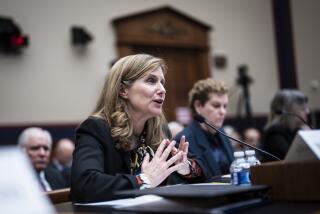Why I signed on to Amethyst
- Share via
In many ways, the Quakers have it right. This thought has crossed my mind many times in the last three years as president of Quaker-founded Whittier College, but no time more forcefully than in the last few days.
I am one of 100 college and university presidents who signed the Amethyst Initiative, a movement that addresses the ongoing crisis concerning underage drinking and calls for a reexamination of related national policies and state laws. The initiative has stirred its share of controversy: An Aug. 21 Times editorial reacted coolly to the idea of lowering the drinking age, and an Aug. 27 Op-Ed article called those of us who signed the initiative a “well-intentioned but misguided group of college and university presidents.”
I, like many of the signatories, do not claim to know what the “magic” legal drinking age should be nor if a change in the drinking age will lead to more responsible conduct. What I do know, however, as a president and as a parent of recent college graduates, is that our laws and policies regarding alcohol use by young people are simply not working.
Let me offer an unpopular reality check. Despite legal consequences for underage drinking, decades of public-service marketing for restraint and a law implemented 24 years ago that may -- or may not -- have been a contributing factor in the statistical decline of related drunk-driving accidents, we continue to have a national crisis. Although it is perhaps more visible on college campuses, this crisis is in no way exclusive to college students. Underage drinking and related irresponsible or unhealthy behavior happens everywhere and anywhere.
Clearly, we have two choices: We can continue shutting our eyes to the problem, or we can begin to discuss solutions. As president of an institution that teaches students to do the latter, I know I must lead by example.
So I have joined the Amethyst Initiative and have been vocal about calling for reasoned discussion, a full analysis of evidence from studies in this country and abroad, and the benefit of expert opinion from those who deal with the challenge of alcohol use and abuse on a regular basis. After this discussion, we as a nation can decide whether the current law, while flawed in its outcomes, is the best we can expect or whether change is in order.
However, a few days ago, news about the Amethyst Initiative hit the media, and anything but reasoned discussion has occurred. Mothers Against Drunk Driving, an organization I admire, has warned parents that they should not send their students to colleges whose presidents signed the initiative for fear that such presidents will not enforce the drinking laws. MADD’s warnings are certainly not true. A Times blogger headlined a post, “Whittier College prez wants to lower drinking law.” Also not true. And reporter after reporter has questioned me on my stand, trying to elicit controversy to sell headlines rather than promote wide-ranging, intelligent debate.
So, again, I say: The Quakers have it right. Those familiar with this minority religion will know that the Quakers (or Friends, as they are often called) value serious discussion and respect for people offering differing points of view. Although consensus is not a required outcome of such discussions, Quakers urge at least an attempt to find common ground. Most important, perhaps, Quakers often start meetings in silent contemplation. Silence allows them to listen to the small voice within that promotes good and reminds them to prepare to listen to others.
Whittier College is no longer affiliated formally with the Quakers (a story that involves Richard Nixon and must await another telling), but as president of this principled, prestigious college, I work to ensure that each student understands the lessons that our founders intended. All colleges have a mission to educate students to think critically, evaluate evidence, reason well, articulate cogently and devise creative, workable solutions to important issues. But at Whittier, because of our founding principles, we set the bar even higher. We teach each graduate the value of listening -- to pause before leaping to a conclusion, to truly understand opposing arguments and to find agreement on steps that lead to better policies and communities.
We don’t have to be Quakers to think well, but we can all learn from their practices. As we renew our national discussion about this important matter of public policy and health, let’s pause, listen and try to find some common and higher ground.
Sharon Herzberger is president of Whittier College.
More to Read
A cure for the common opinion
Get thought-provoking perspectives with our weekly newsletter.
You may occasionally receive promotional content from the Los Angeles Times.






